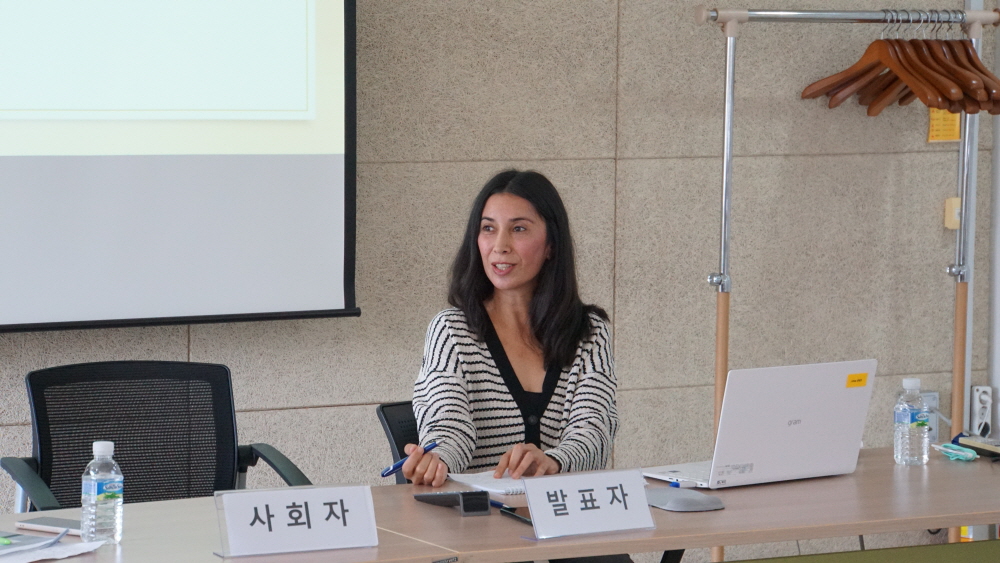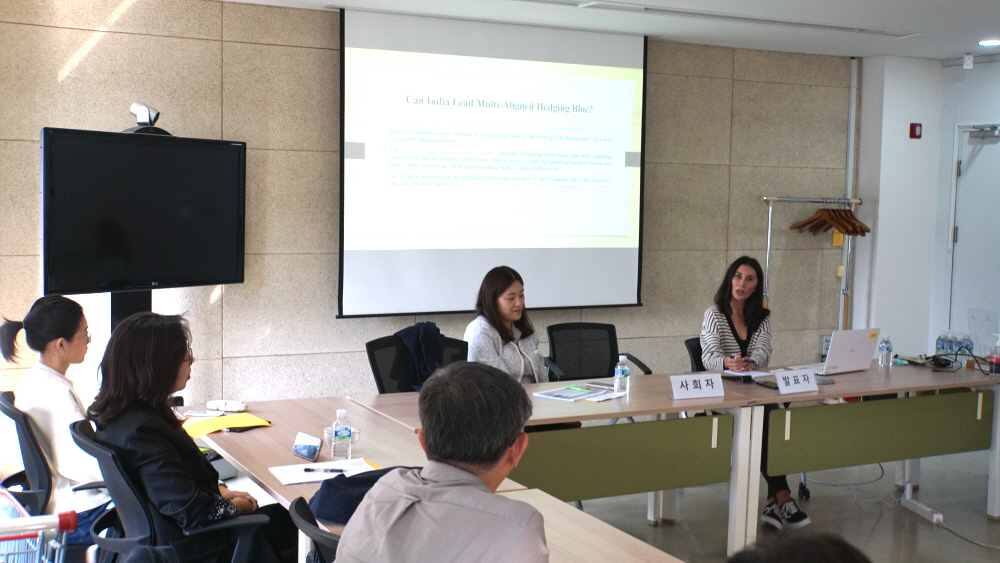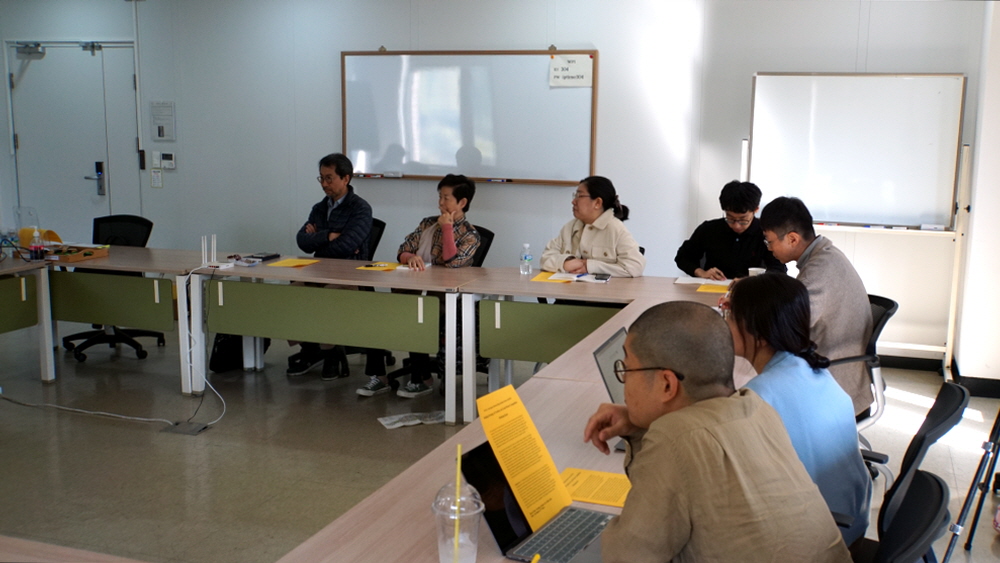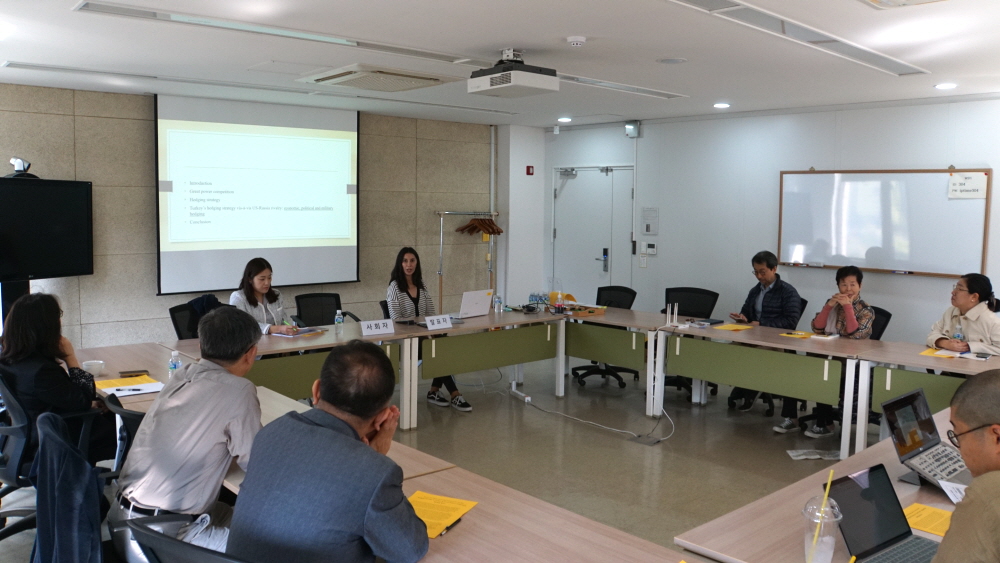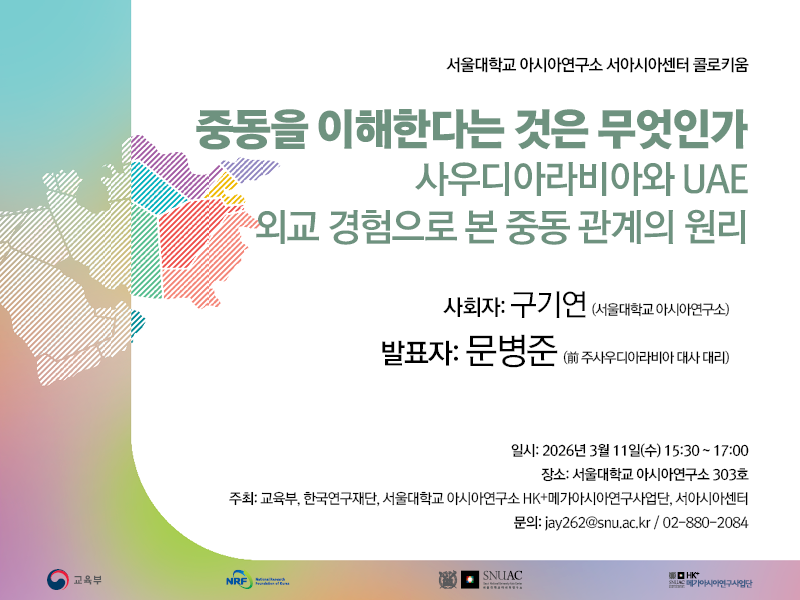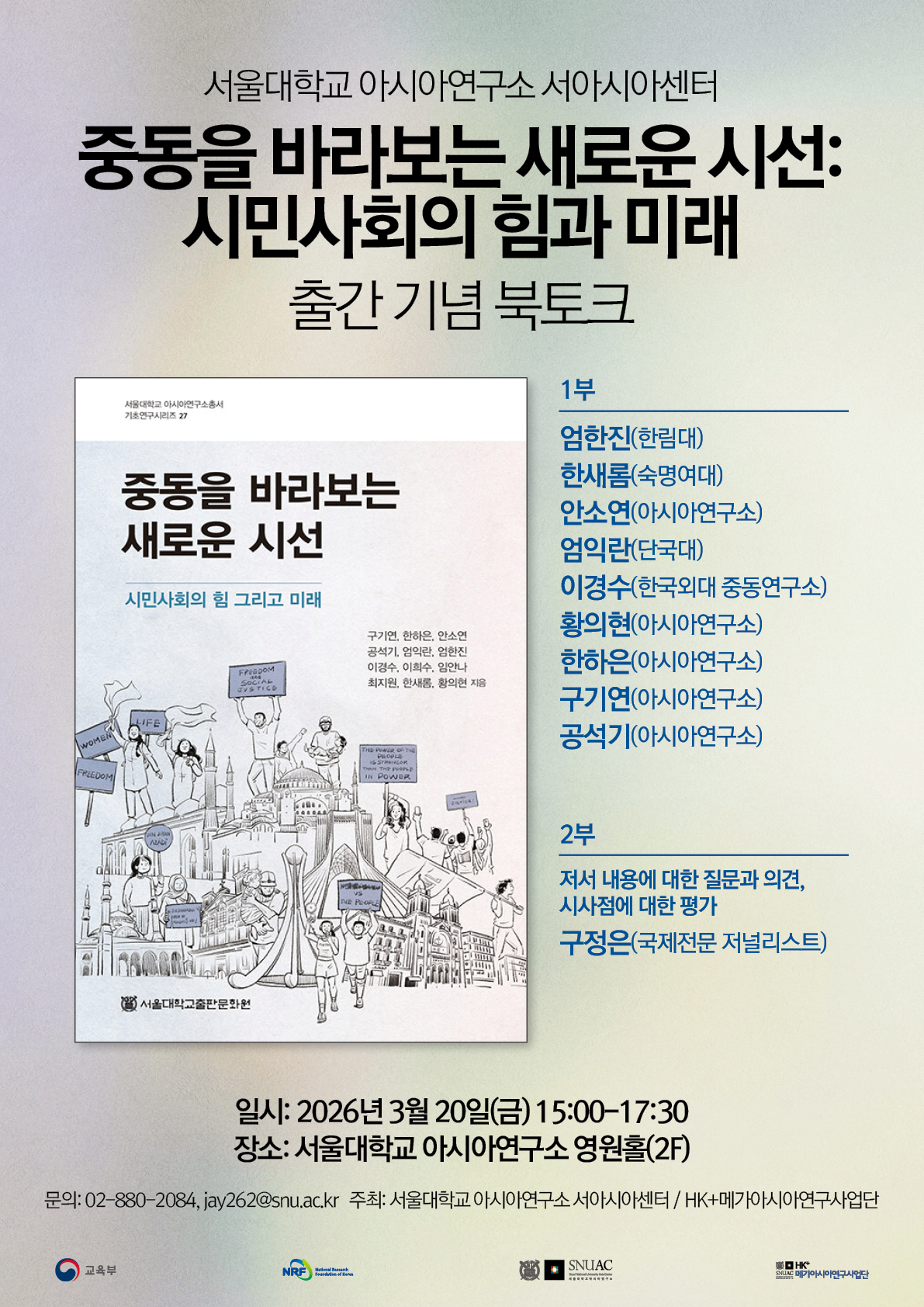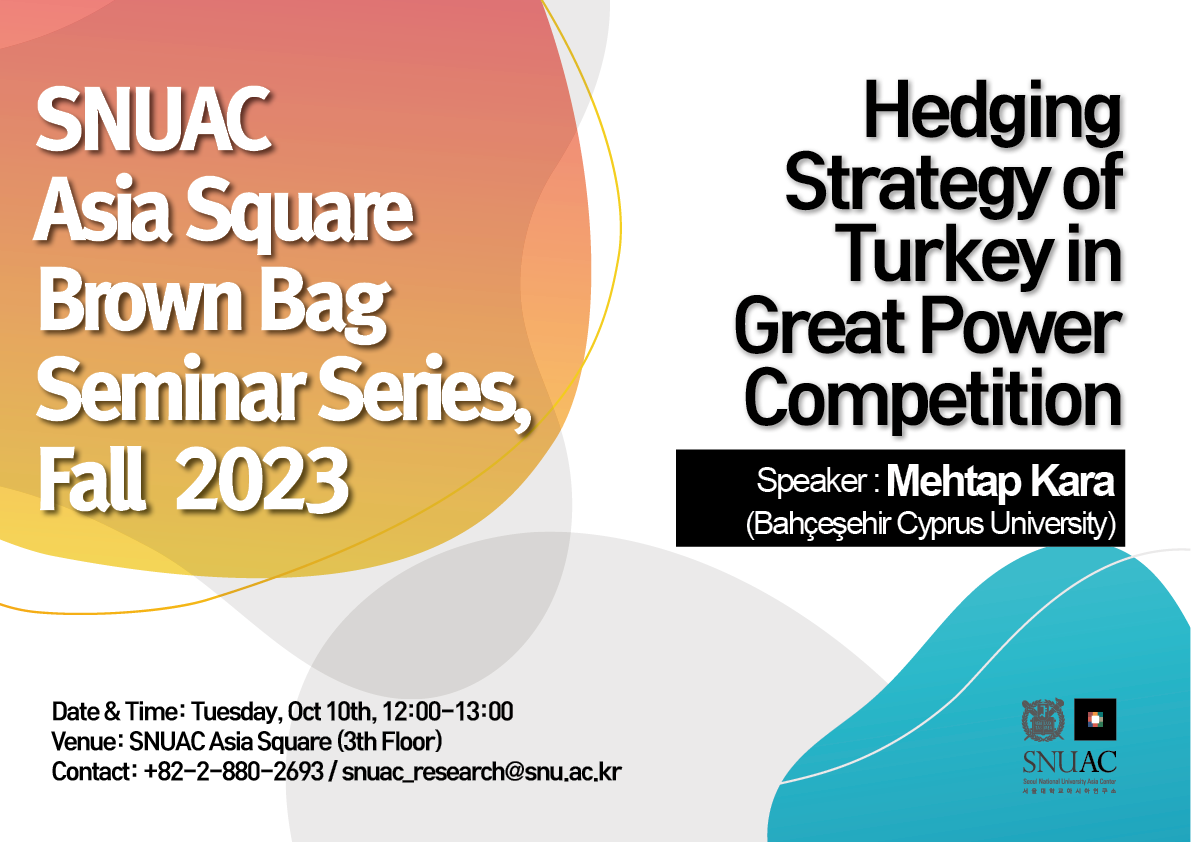
[SNUAC Asia Square Brown Bag Seminar Series Fall 2023] Hedging Strategy of Turkey in Great Power Competition
The ongoing power shift and challenges to the rules-based international order highlight the importance of the secondary states in various regions and their alignment strategies. Since Russia’s invasion of Ukraine in February 2022, the United States (US) and its allies have failed to recruit more states from the developing world to join the Western coalition against Russia and China to defend the liberal international order. Turkey as a swing state is an example of this trend despite being a NATO ally. It occupies a strategic geography in the changing power structure, and it is an important country for European security.
This presentation will explain how Turkey has adopted strategic hedging to avoid taking sides in the US-Russia rivalry by engaging both sides to increase the range of strategic options available to it. The ‘return-maximizing’ and ‘risk-contingency’ measures of hedging allow Turkey to cope with competing great powers and the systemic uncertainties in world politics simultaneously. The country’s hedging against an uncertain future helps Turkey to extract commercial concessions, elevate the country’s status, preserve strategic autonomy, and provide regime survival for President Erdoğan in 2023 elections despite severe economic problems and domestic polarization in the country. The presentation will introduce Turkish elites’ attempt of (re)positioning the country between US and Russia and possible implications of Turkey’s contradictory and ambiguous hedging behaviours in shaping the emerging regional order as well as the behaviours of the competing great powers.
발표자 약력
Mehtap Kara is a Visiting Scholar at the Seoul National University Asia Center (SNUAC) from Bahçeşehir Cyprus University (BAU). She received her PhD in International Relations from Eastern Mediterranean University and currently works as an assistant professor at BAU. Her articles have appeared in peer-reviewed journals including Southeast European and Black Sea Studies, Turkish Studies, and Uluslararası Iliskiler-International Relations. Dr. Kara’s areas of research include IR theories, foreign policy analysis, and political psychology. Her research at the SNUAC focuses on hedging strategies of secondary states including Turkey, India, South Korea, and Brazil in great power competition. The research aims to map out economic, political, and military hedging strategies of four influential countries which occupy a strategic geography in the changing international order.
Photos
Review
10월 10일 아시아연구소 브라운백 세미나에서 방문학자 Mehtap Kara박사의 <터키의 헤징전략>을 주제로 한 발표가 진행되었다. 러시아-우크라이나 전쟁이 지속되고 있는 상황에서 대국경쟁 속 자국에 유리한 전략을 구상하는 터키의 현주소를 알아보는 시간이었다.
우선 발표자는 터키의 상황을 간략히 설명하였다. 터키는 2016년 7월 쿠데타가 실패한 이후 미국과 러시아의 경쟁이 심화되는 상황에서 모호하고 모순적인 외교 행보를 취하고 있다고 전체적인 상황을 설명하였다.
발표자는 이러한 상황을 3가지 방면의 헤징전략으로 해석하려고 했다. 하나는 경제적 헤징인데, 터키는 경제적으로 서방의 제재에 동참하기를 거부하며 러시아의 주요 무역 파트너가 되고 있다는 것이다. 터키의 대러시아 수출은 87% 증가했으며 터키는 러시아와 서방 간의 무역 허브로 자리하고 있다.
하지만 동시에 EU는 여전히 터키의 주요 무역 파트너이다. EU는 2022년 기준으로 무역 규모가 1,964억 달러에 달하는 터키의 최대 시장을 차지하고 있다. 또한 미국의 제제에 가담하지 않고 러시아의 석유를 유럽에 유통하는 것을 통해 러시아와의 에너지 협력을 강화하고 있다고 보고있다.
다음으로 터키의 정치적 헤징을 살펴보면 터키는 민주주의와 권위주의의 대립이라는 미국의 전략에 가담하고 있지 않다고 발표자는 판단하고 있다. 예를 들어 터키는 SCO 참여와 브릭스 가입에 대해 관심을 가지고 있으며 터키는 다자 플랫폼을 통해 러시아와 구속력 있는 관계를 맺고 있다는 것이다. 또한 곡물 거래를 중개한 터키의 노력으로 우크라이나 곡물이 러시아가 봉쇄한 흑해 항구를 안전하게 통과할 수 있게 되었는데 글로벌 식량 위기 위험을 줄이는 것을 통해 발전도상국가들 간에서 위상을 높이고 있다고 한다.
마지막으로 터키의 군사적 헤징은 나토 동맹국으로서의 무기 수입을 줄이는 반면에 터키제의 드론이 우크라이나전쟁에서 적극적으로 사용하게 하는 등 자주적인 길을 모색하고 있는 데서 비롯된다고 했다. 발표자는 다음 과제로 인도, 한국과 같은 미들파워가 어떻게 헤징전략을 사용하고 있는가에 대한 연구도 필요하다고 했다.
토론에서는 한국의 사례를 들면서 한국은 터키만큼의 국력이 안되고 헤징을 할 여지가 적다는 의견이 나왔다. 하지만 한국 또한 복잡한 전략적 환경에 놓여져 있고 복잡한 만큼 연구의 가치가 있다고 피력했다.
필자는 한국 역시 미러경쟁, 혹은 미중경쟁 속에서 방향을 잡아야 한다고 생각한다. 현재 한국 언론은 동북아시아 정세를 민주주의-권위주의 진영의 대립, 한미일과 북중러의 대립으로 인식하고 “신냉전”이라는 미국이 주도하는 입장에 적극적으로 가담하고 있다. 북한과 직접 맞닿아 있고 대립구도가 더 확실해지면 제일 먼저 타격을 입을 수 있는 지역으로서 한반도의 위치를 다시한번 생각해 보아야한다고 여겨진다.
발표자는 터키의 이러한 헤징전략이 외교적으로 더 많은 코스트를 필요로 하고 있으며, 한국 외교도 “좋은 외교”로 평가 받으려면 이러한 코스트를 두려워 하지 말고 적극적으로 움직이고 성과를 내야 된다는 의견을 밝혔다.
글, 사진 | 한승헌(학술기자단, 연구연수생 18기)
